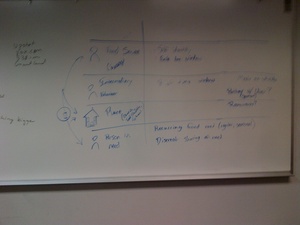The pitches have been made, the sessions have been voted on, and this is your CityCamp NC 2014 unconference schedule.
We will have four concurrent rounds of sessions happening at once. Here are a few tips to have a successful session at CityCamp NC:
- Do a quick round of introductions
- Have the moderator restate the pitch/topic
- Designate a scribe to take notes
- Make sure everyone can contribute to the conversation
- Stay on schedule, sessions are 50 minutes long
- Before your session ends, determine any next steps or actions—forming a team to compete is a great action
| Time |
Lecture Hall |
Room #111 |
Room #112 |
Room #113 |
Room #114 |
| 10:30 am |
Building sustainable apps |
The dull and the difficult |
Durham County library makerspace |
Triangle Interactive arts map |
Bike paths for all of NC |
| 11:30 – 12:50 pm | Lunch – Find a good place to eat | ||||
| 1:00 pm | Re-humanize |
Food deserts |
NC food inspector |
Open data policy framework |
(open) |
| 2:00 pm | InstaRep |
Mapping ideas for vacant / for sale properties |
City notifications and information solution |
Open data accessibility |
(open) |
| 3:00 pm |
Raleigh food corridor |
Explore SeeClickFix |
Paint swap |
Where the people at? |
(open) |
| 4:00 pm |
How can we create and facilitate citizens-centric tech |
Council agenda |
Sustainable story-telling for communities |
Trails | (open) |
Food Deserts 1:00 PM
We did a lot of idea sharing about where and how to identify areas of need.
We need to take it to the next level and identify individuals. Self Identify? Sign up? Referrals?
An Uber for those in need.
Building Sustainable Apps (10:30 am)
Question: how do we take stuff we build during hackathons and similar types of events/programs and make them sustainable and usable?
- Web based: Design mobile-friendly, web-based applications rather than platform-specific, standalone apps (iOS, Android, etc.).
- Use common frameworks and consider the tech stack: use common development frameworks (ex: Bootstrap) and appropriate programming languages to make it easier to support long-term maintenance, enhancements, and extensions.
- Ownership: If working with a developer or third-party organization, specify in the agreement that the code becomes open source in order to avoid situations where a developer controls/owns the code.
- Support: What’s an appropriate business model? How to get from individual/small group to community ownership to commercial support? How to bridge the gap between open source and community and commercial ecosystem?
- Build for scale: If an app solves 1 specific project, could it be designed in such a way that it could be more useful in a broader scale?
- Build for future development: In order to encourage adoption and uptake by municipal departments or agencies, it will need to be maintained, extended, and enhanced in the future. Will departments have in-house resources to do so? Could they will minimal training?
- Data sources: If something relies on data, is it using a static data set or a dynamic data set? “I have a hard time trusting an app that relies on a static data set.”
- Data governance: How recent is the data? How often is it updated? What information about the data is provided so users can understand data source(s).
- Set realistic expectations: It is unlikely that an app, tool, program, website, etc. developed in a weekend or during a hackathon will be able to be deployed as is. It will take further development, documentation, and a community to support. Be realistic.
Next steps: continue development of this list into a checklist or set of guidelines for hackathon developers.



